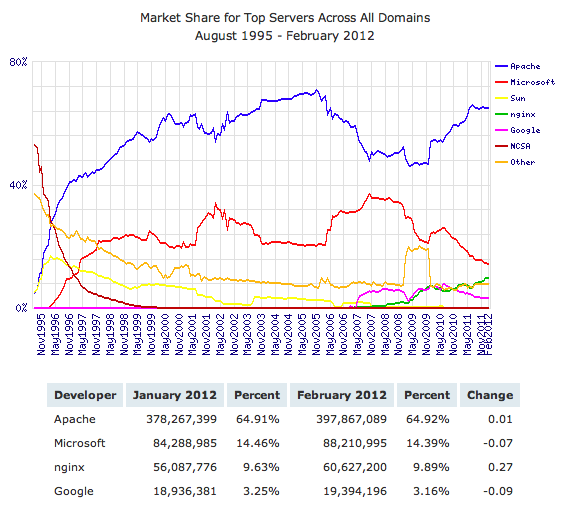According to the Netcraft Web Server Survey for February 2012, Nginx was “the only server to experience a non-negligible market share increase this month” by picking up 0.27 percentage points. Good news for the upstart Web server, just as the brand-new company behind Nginxtakes the wraps off its commercial packages.

Nginx has had quite the growth spurt over the past year. In February of last year Nginx had 7.57% of the market, or about 21 million domains hosted with Nginx. Microsoft had 20.04%, or about 57 million. Apache was at 60.10%, with more than 171 million domains.
Fast-forward to this February, and Nginx has grown to 9.89% of the market surveyed by Netcraft. The overall market has grown considerably, as well – Nginx now has about 60 million domains. Microsoft has dropped to 14.38% of the overall market, with just over 88 million domains, and Apache has reclaimed some of the market and sits at 64.92% or more than 397 million domains. To put that another way, in the last year (according to Netcraft) Nginx has picked up nearly 40 million domains, while IIS has picked up about 31 million.
From the Netcraft February 2012 Web Server Survey

That’s not too shabby for a project that has a tiny developer team and a mere $3 million in funding so far
Commercial Offerings
The first set of commercial offerings from Nginx are three support tiers that range from $1,100 a month to more than $6,600 a month. The starter package, Essential, includes support for up to 10 servers and covers two incidents per month with a resolution time of 96 hours (or less). It includes no phone support, optimization assistance, or feature development options.
For companies that are depending on Nginx, there’s the big daddy package that starts at $6,600 a month or $70,000 a year. It has 24×7 support, covers an unlimited number of servers and an 8-hour response time for “severe” issues. Customers also get 12 hours of support calls per year, optimization assistance and can even get developer time to implement features (at an extra fee, of course).
All plans come with emergency bug fixes, updates, software updates and security fixes.
So far, the commercial entity hasn’t diverged from the open source Nginx offering. It will be interesting to see if the company also starts offering proprietary add-ons for Nginx or if they stick with a support-only model. Given the rapid adoption of Nginx, it seems likely that the company will be hearing from quite a few businesses that want a support contract.
If you’re using Nginx, I’d be curious to hear how smoothly your deployments have gone and if you’ve run into any major issues that would have benefited from support.

















